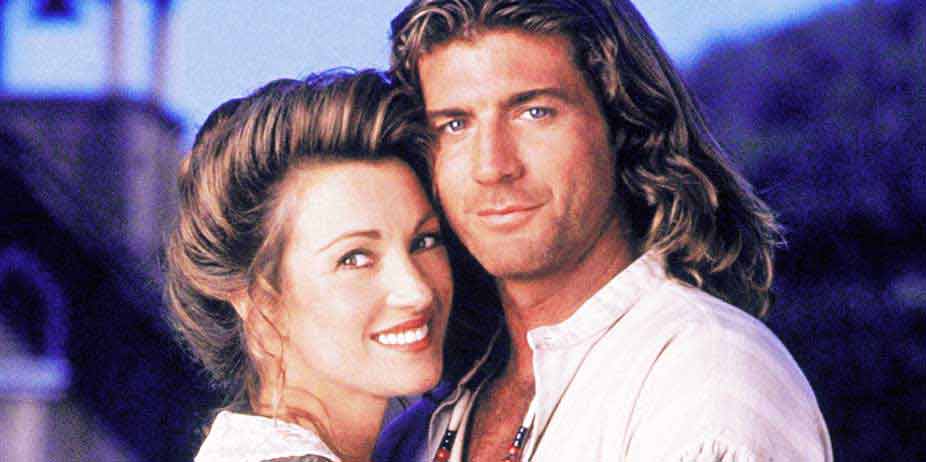
Doctor Quinn, Medicine Woman, Season One (1993)
I was all of ten years old when this series first premiered, and every time I went to my grandmother's house to watch it, I fell a little more in love -- with the town, with the characters, and most of all, with the strength of its women. While the DVD sets are ridiculously over-priced, they also represent the hopes and dreams of a little girl who idolized Dr. Quinn to the point of being determined to dream big.
With the death of her father and the subsequent loss of most of their Boston patients, Michaela Quinn (Jane Seymour) searches for a world in which female physicians will be accepted. Her advertisement for a post leads her to the small but ever growing town of Colorado Springs, where she expects a warm welcome but is instead regarded with suspicion and distrust by most of the locals. It seems that the telegram operator left the a off her name, and the reverend assumed she was a man. The only person in town who seems to take her seriously is Charlotte (Diane Ladd), who runs the boarding house and is raising three rambunctious children on her own after her worthless husband ran off with their money sock. Then there is Sully (Joe Lando), a man of seemingly few words who offers to lease his homestead to "Doctor Mike" for a reasonable price. Michaela is still struggling to gain the trust of the townspeople when tragedy strikes, leaving her to face a new kind of challenge: motherhood.
Most doctors are not homemakers, and Michaela is no exception, which results in a delightful blend of frustration and triumph as she attempts to care for Matthew (Chad Allen), Colleen (Erika Flores), and Brian (Shawn Toovey). Michaela is a strong figure and it's not hard to see why so many young women, myself included, idolized her. Her heroism is what holds the series together, along with the wonderful townspeople, made up of characters you love despite their faults. I have rarely liked an ensemble cast so well, but cannot help having a soft spot for crotchety Loren Bray (Orson Bean), snide Jake Slicker (Jim Knobeloch) and even bad-tempered Hank (William Shockley).
The first season is not impressive for its flow so much as its spirit. It introduced a new brand of western to television that sadly has not been seen since, with just enough history and patriotism to make it good. There are certain moments that modern ideals intrude in momentary flashes, but they are not significant enough to slip into overt preaching. Mistreatment of the Indians and the generally negative depiction of the army is the worst of it, but the truth remains that General Custer was hardly a humanitarian when it came to Indian affairs. For the most part, the series is also quite clean, and there are not too many episodes that I would hesitate in showing to children. There is a saloon in town with prostitutes in residence, so there are various references to their profession and its dangers. There is a reference to Colleen having started her menstrual cycle for the first time. One episode revolves around Michaela's concerns that Matthew might go too far with his girlfriend ("Rite of Passage"). Michaela comes across a naked man in an early episode; nothing is shown but the waist up.
Violence is prevalent in all the episodes. There are gun fights and barroom brawls. The worst of it is when Sully is beaten nearly to death. A man is trampled by wild buffalo. Michaela is always stitching up wounds, setting broken bones, or putting her operating table to use. There is mild Indian spiritualism involved; Cloud Dancing and Sully reference praying to "the spirits" for guidance. Matthew experiences odd visions while on an Indian quest. There is an obvious sexual tension between Michaela and Sully, which is used to the show's advantage, such as forcing them to spend the night together under a tent in a storm, but nothing inappropriate ever takes place.
One thing worth mentioning are the impressive guest appearances, which include John Schneider as a down-and-out cowboy, Jane Wyman as Michaela's stern but likable mother, and Johnny Cash as a black-clad gunfighter. My grandfather loved Johnny Cash, but this was the first time I ever saw him "in person," and that image has stuck with me all the years since. It's safe to say that Dr. Quinn colored my childhood and so there is a great deal of nostalgia attached, but watching the series as an adult has given me a renewed appreciation for its strengths. It has a great deal of heart, and its messages about family and the strength of community are as timeless as its humorous antics and tearful partings. Do the young women in your life a favor and introduce them to Dr. Quinn, Medicine Woman.
